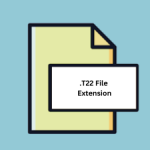.OLL File Extension

TrialDirector Object Load List
| Developer | inData |
| Popularity | |
| Category | Data Files |
| Format | .OLL |
| Cross Platform | Update Soon |
What is an OLL file?
.OLL (TrialDirector Object Load) files are data files associated with TrialDirector, a widely used trial presentation software utilized in legal proceedings. These files are primarily utilized to store various types of multimedia evidence, such as videos, documents, images, and annotations, in a structured format for use during trials.
More Information.
The history of .OLL files dates back to the early development of TrialDirector software, which was first introduced to the legal market in the late 1990s. Initially, these files were created to address the challenges faced by legal teams in organizing, managing, and presenting large volumes of multimedia evidence during trials. Over the years, TrialDirector has evolved to become a comprehensive solution for trial presentation, and .OLL files remain a fundamental component of its functionality.
Origin Of This File.
The .OLL file format was developed by inData Corporation, the company behind TrialDirector, to facilitate the efficient organization and presentation of evidence in legal proceedings. It serves as a proprietary format specifically designed to meet the needs of legal professionals for managing and presenting multimedia evidence in courtrooms.
File Structure Technical Specification.
.OLL files are binary files that contain a structured representation of multimedia evidence, including video clips, documents, images, and associated metadata such as annotations and exhibit information. The exact structure of .OLL files is proprietary to TrialDirector and is not publicly documented. However, they are designed to be compatible with the TrialDirector software suite, allowing users to import, organize, and present evidence seamlessly within the application.
How to Convert the File?
Windows:
- Open TrialDirector software on your Windows computer.
- Load the .OLL file you wish to convert by navigating to “File” > “Open” and selecting the desired file.
- Once the file is loaded, navigate to the content you want to export.
- Click on the “Export” or “Save As” option, typically found in the File menu or toolbar.
- Choose the desired format for conversion, such as PDF, JPEG, MP4, etc.
- Specify the export settings, if applicable, and select the destination folder for the converted file.
- Click “Export” or “Save” to initiate the conversion process.
- Once the conversion is complete, you can access the converted file in the specified destination folder.
Linux:
- Install Wine on your Linux system if you haven’t already done so.
- Download the TrialDirector installer for Windows from the official website.
- Use Wine to run the TrialDirector installer and follow the on-screen instructions to install the software.
- Once TrialDirector is installed, launch the program using Wine.
- Load the .OLL file you wish to convert by navigating to “File” > “Open” within TrialDirector.
- Follow the same steps as outlined in the Windows section above to export the .OLL file to your desired format.
- After conversion, you can access the converted file from the specified destination folder.
Mac:
- Open TrialDirector software on your Mac computer.
- Load the .OLL file you want to convert by navigating to “File” > “Open” and selecting the desired file.
- Once the file is loaded, navigate to the content you wish to export.
- Click on the “Export” or “Save As” option, typically located in the File menu or toolbar.
- Choose the desired format for conversion, such as PDF, JPEG, MP4, etc.
- Specify the export settings, if applicable, and select the destination folder for the converted file.
- Click “Export” or “Save” to initiate the conversion process.
- After the conversion is complete, you can access the converted file from the specified destination folder.
Android:
Converting .OLL files on Android devices may require exporting content to a compatible format using TrialDirector on a Windows or Mac computer. Once the content is converted, you can transfer it to your Android device via USB or cloud storage and then open it using compatible third-party applications for viewing or editing.
iOS:
Similar to Android, converting .OLL files on iOS devices may involve exporting content to a compatible format using TrialDirector on a Windows or Mac computer. Once converted, you can transfer the file to your iOS device via cloud storage or other means and then access it using compatible third-party applications for viewing or editing.
Advantages And Disadvantages.
Advantages:
- Centralized organization of multimedia evidence.
- Streamlined presentation workflow during trials.
- Compatibility with TrialDirector software for enhanced functionality.
- Ability to include annotations and exhibit information alongside multimedia content.
Disadvantages:
- Proprietary format may limit interoperability with other software.
- Dependence on TrialDirector software for viewing and managing .OLL files.
- Potential compatibility issues across different versions of TrialDirector.
How to Open OLL?
Open In Windows
.OLL files can be opened directly with TrialDirector software on Windows platforms.
Open In Linux
TrialDirector is not natively supported on Linux, but users may explore compatibility options using Wine or other virtualization software.
Open In MAC
TrialDirector is compatible with macOS, allowing .OLL files to be opened directly on Mac computers.
Open In Android
TrialDirector does not have an official Android app, so opening .OLL files on Android may require exporting content to a compatible format and using third-party applications.
Open In IOS
Similarly, TrialDirector does not have an official iOS app, but .OLL files can be accessed on iOS devices through compatible third-party applications or by exporting content to a supported format.
Open in Others
Due to the proprietary nature of .OLL files and TrialDirector software, opening .OLL files on other platforms may require using virtualization or conversion methods to access the multimedia content within the files.













